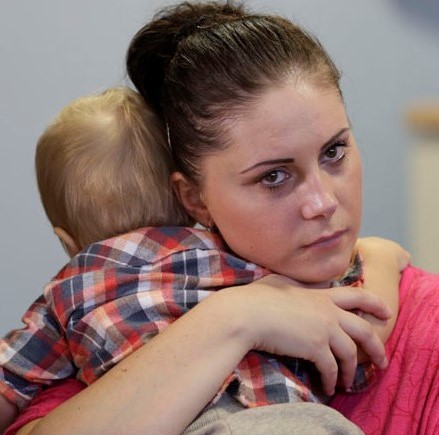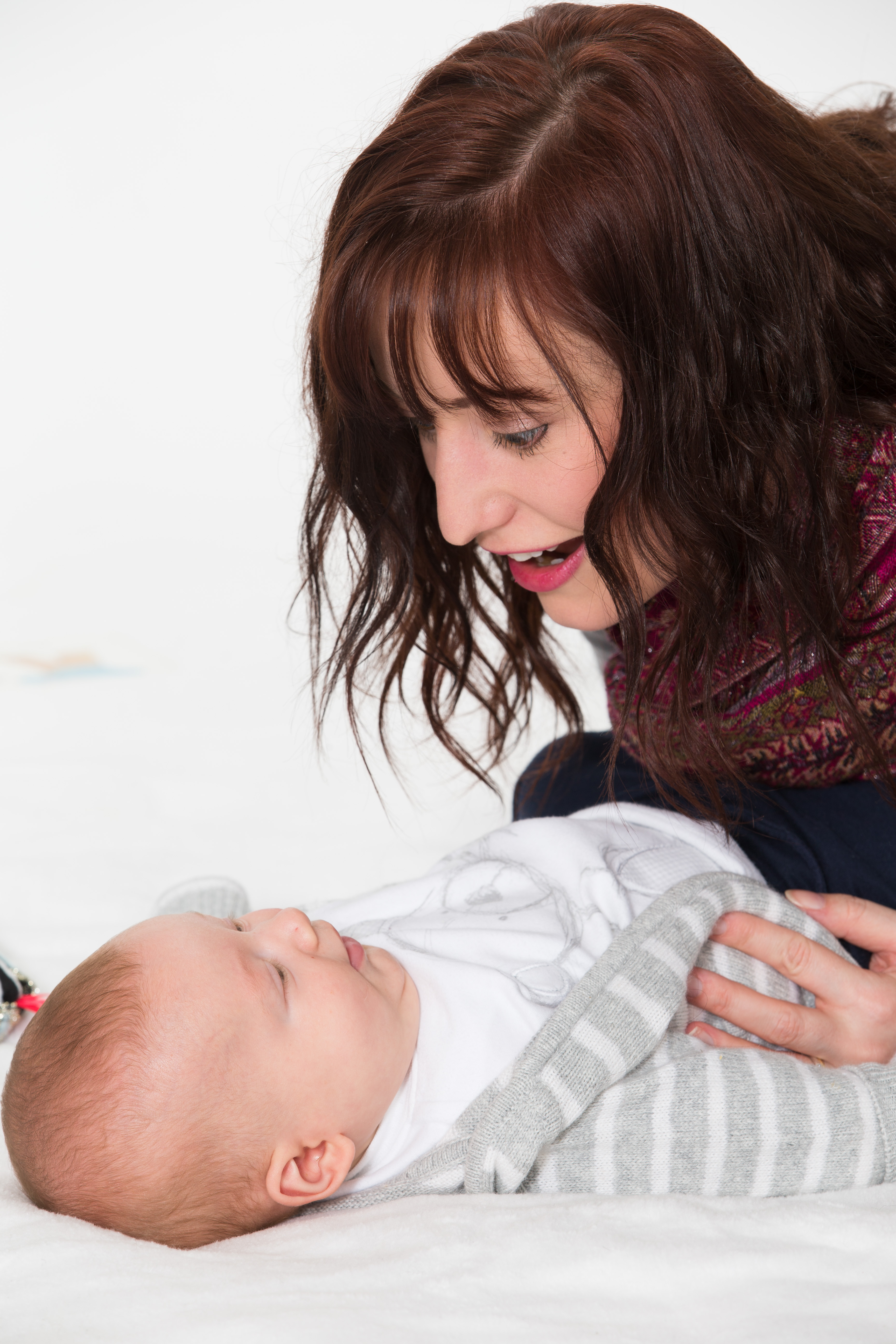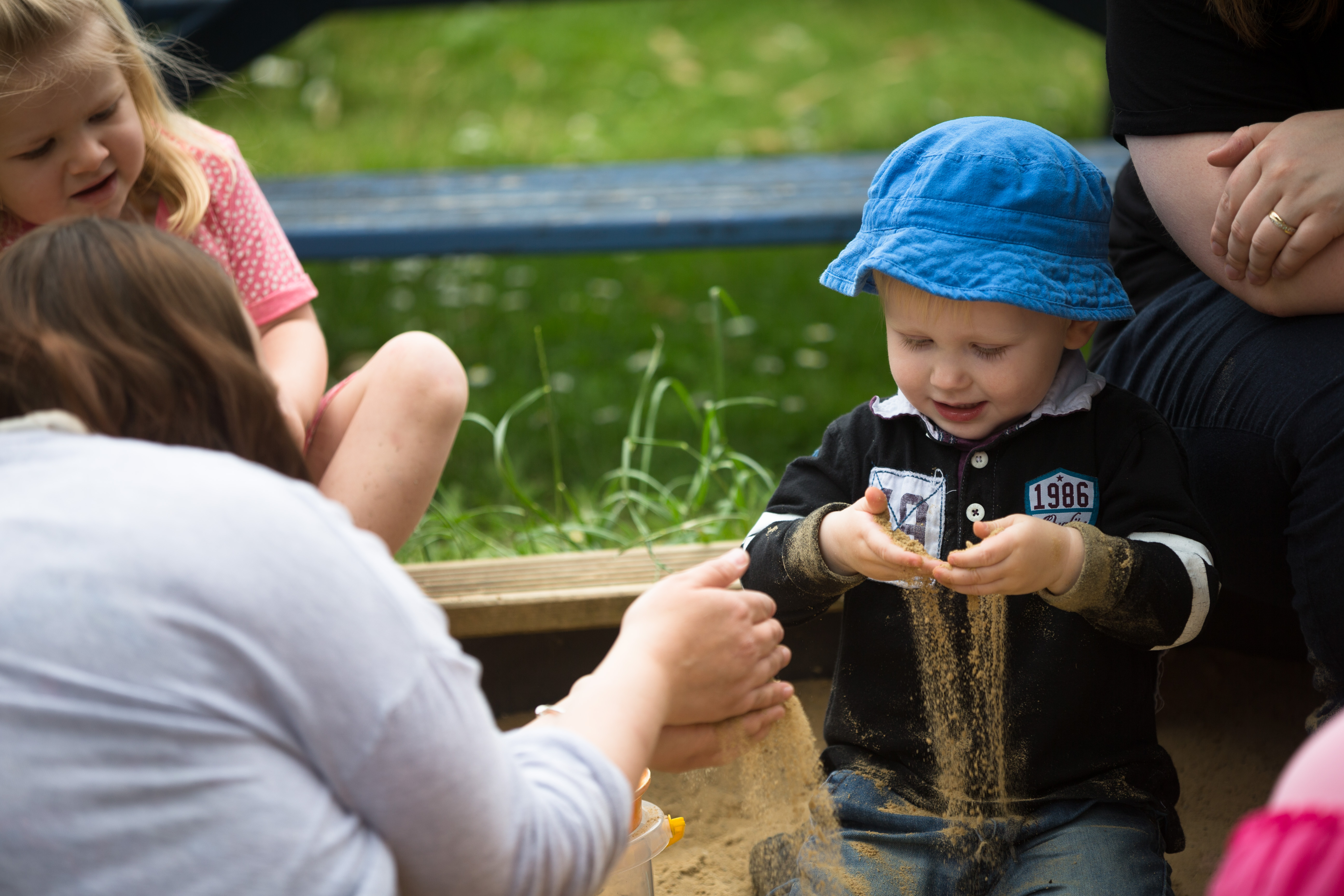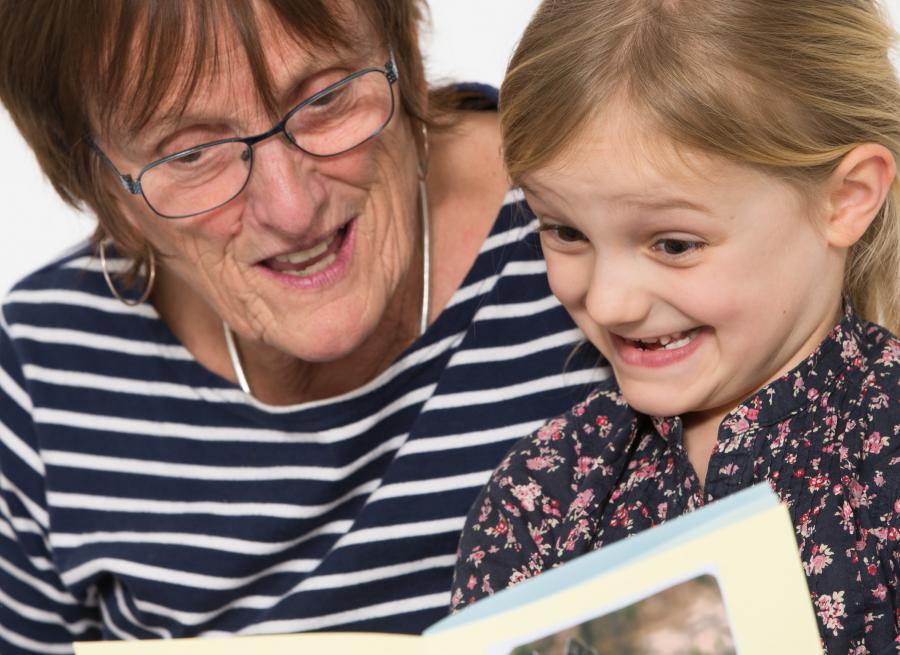Green
early explorers child health clinic study
Child health clinics are the key place that practically every parent takes their baby or toddler to *, even parents who don't use any other services. They can ask the health visitor or community nursery nurse any questions, and get reassurance about their baby's weight. The clinics are therefore an ideal place for Peep practitioners to get to know a wide range of families, while they wait. The practitioners chat and share child development ideas and activities with them, providing a rug and toys for their baby to play with, and can invite them to attend a Peep Early Explorers group.
Professor Jane Barlow and Chris Coe at the University of Warwick carried out a two-year evaluation into this joint work: ‘Early Explorers: Integrating partner professionals to support parents with their children’s development from birth’ (2011) .
key findings
The study reported that this process of joint working provided a positive way of:
- promoting positive infant mental health and development
- working together to reach those most in need – identifying and supporting vulnerable groups
- over-coming barriers and building relationships, trust and confidence
- improving and extending the service offered to families, by working with a family support practitioner from another organisation.
In this study, the Peep practitioners worked for the charity Peeple, but since then Peep-trained practitioners working in child health clinics have worked for children's/ family centres or family hubs etc, and health practitioners such as community nursery nurses also use Peep within their clinic sessions.
There were also positive outcomes in engaging families who access services infrequently, in supporting their children’s development.
- The Early Explorers clinics promote maternal mental health - supporting parents that they may support their infants.
- The child health clinic offers a unique opportunity to meet and forge relationships with parents in a non-stigmatising, non-threatening environment, in a place where they already go.
- The opportunities for social engagement created by an Early Explorers clinic offer an important opportunity to increase parental confidence and reduce social isolation.
- Parents reported spending more time in the clinic when the practitioners are there, learning new skills and having a better appreciation of infant development.
- Families can be sign-posted on to Peep and other local services.
You can download the research summary and an article published in Community Practitioner about the project and the benefits and challenges of partnership working.
"And I just thought, I’m going to go in there and everybody will judge you because all your baby did was cry… just going to say ‘well, have you fed her, have you done her nappy, have you done this…?’. And that’s what you used to get from people walking round the shops. But it didn’t bother nobody. And I thought Oh my god [laughs]! I’m in a place where nobody’s staring - because all she does is cry.... Because I didn’t know what to expect at first.…
But then when we went to the first class they had duvets down and things, with treasure baskets. And when they actually start singing the children are just… it’s amazing sort of thing to them. Their little faces [laughs].... she loved it!
She cried a lot for the first five months and then when we seemed to go to Peep she came out of her shell a lot more. She was more calm. More willing to be more patient in doing things. And she used to have trouble socialising, because I don’t know many people with children her age… but she was gone.… It was always calm and they always got parents talking to each other. Because when I first went I thought Oh nobody will want to talk to me because… but no, they sit down and they introduce you and everything. And when we have the group discussion it was more that you feel like you’ve known people for a long time… we talked about the textures and things and how they help children learn and everything like that. It’s… I don’t know how to word it really.… you feel more confident when you know you’re not the only one going through what you’ve been through sort of thing." (Parent L)
Peep-trained practitioners from any professional background can use the Learning Together programme with families in any context or setting. Follow the links for more information about our Learning Together Programme and Training.
* In May 2022, the Parent Infant Foundation and @first1001days campaign published a report 'Why health visitors matter', which makes a compelling case for the government to reverse the decline in public health funding - since 2015 there has been an estimated 30% decline in the number of health visitors, with significant negative consequences for babies and their families.
(University of Warwick)
Feature box colour:


Side Quote Color:
foundation peep study
This study followed 150 three- and four-year-olds, half of whom were participating in the Peep Learning Together programme, over a two-year period. The study showed that the Peep children benefited in learning and self-esteem.
These children made greater progress than others in:
- vocabulary
- language comprehension
- understanding about books and print
- number concepts.
The children’s self-esteem was also higher, and they felt more confident in what they could do both physically and mentally.
The study was carried out by Dr Maria Evangelou and Professor Kathy Sylva at the University of Oxford (2004). You can download a research summary (26 pages) paper from the journal of Early Childhood Research & Practice.
Follow the links for more information about our Learning Together Programme and Training. The programme is also used in foundation stage, daycare and school settings, often as Transition Peep for a few sessions for the family before the child starts, or while the child is attending the setting.
Feature box colour:
‘This study demonstrates the value of an explicit curriculum, intensive staff training and a collaborative approach to work with parents.’
(Evangelou and Sylva, 2003, p80)

Side Quote Color:
enabling parents study
This independent study examined the impact of the Peep programme for parents/carers. It compared 75 mothers who had attended a Peep group with an equal number of mothers who were individually matched on demographic characteristics and were living in an area with a very similar socio-economic profile, but with no access to Peep.
key findings
The study found that Peep parents, compared to the non-Peep parents:
- reported significantly greater awareness about how to help their child's literacy development
- improved their socio-economic status (as measured by their job)
- took more courses, particularly in basic skills.
Parents also considered Peep to be a source of support and encouragement.
The full report or key findings of the Enabling Parents Study can be downloaded here. The study was carried out by Professor Kathy Sylva and her team at the University of Oxford (2008).
Peep also offers parent accreditation based on everyday activities that parent and child do together, recorded in a portfolio or scrapbook. As well as being a lasting memento, the accreditation can also act as a stepping stone for parents’ own learning.
Feature box colour:

Side Quote Color:
peep antenatal programme study
A small scale evaluation of the Peep Antenatal Programme (n=10) was carried out at the University of Warwick. The Programme (originally known as Peep Reflective Parenting Programme) aims to support strong parent-baby bonding and attachment relationships, helping develop parents' reflective function and confidence in tuning in to their baby’s feelings and behaviour.
The study followed 10 parents who received the intervention programme (in additional to their normal antenatal and postnatal care). Data was collected before the programme began, at the midpoint of the programme and shortly after the programme finished. The primary measures used were the Parent Development Interview, Parent Embodied Mentalising and the Crittenden Care Index.
key findings
- Parents are less intrusive and more inclined to think about, and articulate, their baby’s thoughts and feelings, which is a key indicator of reflective functioning capacity.
- Improvements have been noted in parental behaviours associated with sensitive parenting.
- A reduction has been noted in parental behaviours identified as controlling and unresponsive.
- Parents who were in the clinical categories of risk or ineptness regarding their relationship with their baby, have moved to adequate and sensitive categories.
- Parents described the Programme as enjoyable, informative and non-stigmatising.
- Parents requested additional practical examples of activities, rhymes and techniques that they could practice with their ‘bumps’ and newborns in order to maximise the development of a positive attachment bond. They also asked for further information about infant development, including neurobiology and attachment.
A research summary of the findings can be downloaded here.
Follow the links for more information about our Peep Antenatatal Programme and Peep Antenatal Programme Training.
peep antenatal programme study
Feature box colour:
‘An early secure attachment relationship with one or both parents is known to be highly protective of babies’ psychological and emotional wellbeing and mental health.’ (Slade, 2005)

Side Quote Color:
birth to school study & tracer study
The Birth to School Study (BTSS) is a longitudinal evaluation of the Peep Learning Together programme, with a sample size of 600 families. The Learning Together programme aims to encourage children’s early language, literacy and numeracy and to nurture their self-esteem by supporting parents. Consequently, the BTSS investigated the effects of the programme on parents as well as on children. The six-year span of the study allowed time for potential effects on the parents to ‘filter down’ to the children. The study was carried out by the University of Oxford (2005).
Families who had participated in the Learning Together programme in Oxford were compared to children who lived in a similar area in another city but had not received the programme. Propensity Score Matching was also used to refine the comparison. The children were assessed each year using standardised instruments including measures of language, literacy, numeracy and general cognitive ability. Their socio-emotional development, including self-esteem was also assessed.
Overall, the study found that children who participated in Peep made better progress in a set of skills related to early literacy development, and that they had higher self-esteem. As well as contributing to children’s own development and relationships, these characteristics help their school-readiness.
key findings
The effects of Peep on parents
Peep parents, compared to matched parents from the comparison area, reported a significantly enhanced view of their parent/child interaction when their children were aged one.
When the children were two years old, Peep parents were rated significantly higher on the quality of their care-giving environment.
The effects of Peep on the cognitive and socio-emotional development of children
Peep children made significantly greater progress over time than matched children from the comparison area in a range of skills related to language development and future literacy success:
- vocabulary
- phonological awareness of rhyme and alliteration
- letter identification
- understanding of books and print
- writing.
Children from the Peep group showed a significant advantage (aged 5), compared to the matched children from the comparison area, in the following measures related to self-esteem:
- peer acceptance
- cognitive competence
- physical competence
- general competence
- total self-esteem.
To read more about the Birth to School Study, download a research summary or full report (189 pages), or contact us if you'd like us to send you a copy of the Oxford Review of Education article about the Study. You can also read our Tracer study, for which five of the Birth to School study parents were interviewed, as their Peep children were starting secondary school.
Follow the links for more information about our Learning Together Programme and Training.
longitudinal peep birth to school study
Feature box colour:
‘The results strongly support existing evidence that good quality parenting leads to improved cognitive and social skills for the children.’ (Evangelou, Brooks, Smith and Jennings, 2005)

Side Quote Color:
peep evidence base
Our work has been evaluated in a number of independent research studies by the Universities of Oxford, Queen's Belfast and Warwick. These show that Peep:
- helps children develop strong foundations for language, literacy, and self-esteem - improving outcomes for all, but with the greatest impact for the most disadvantaged,
- successfully reaches families and engages them in their children’s learning,
- helps parents become more aware of their children’s development and how to foster it,
- contributes to parents’ and children’s confidence in themselves as learners, and to parents’ employability,
- enables practitioners from a wide range of professions to develop new skills and fresh approaches to share ideas and unlock parents’ potential.
A Randomised Controlled Trial (RCT) study of the Learning Together Programme was carried out by Queen's University Belfast, funded by the Education Endowment Foundation (EEF). The report was published in 2020; you can watch a short video or read an overview of what the study involves, and how it helps narrow the gap in educational attainment:
- Learning Together Study
- 90-second video: Narrowing the attainment gap with the Peep LTP – findings from a Randomised Controlled Trial (RCT)
Four formal research studies on the Peep Learning Together programme have been carried out by the University of Oxford:
Five of the families who were part of the Birth to School Study took part in a small Tracer study twelve years after they attended Peep, involving a semi-structured interview.
The University of Warwick has carried out the following research studies:
- Early Explorers: Integrating partner professionals to support parents with their children’s development from birth in child health clinics
- Reflective Parenting - Peep Antenatal Programme. This is a pilot report with interim findings.
Case studies from organisations using Peep programmes, around the UK and beyond, demonstrate some of the outcomes from using Peep in a wide variety of contexts and settings.
- This includes a report by the Learning and Work Institute into 'Increasing the employability of parents/carers', which includes a focus on family learning in Derby Peep.
Feature box colour:
Side Quote Color:
education case studies - settings, schools and adult learning
The Peep Learning Together Programme can be used within pre-schools, school or nursery classes and childcare settings. Sometimes this is for new families, when a Transition Peep course is offered to families, but the programme is also used during regular sessions.
In Fife, practitioners have been Peep-trained in all their nursery settings, so that Peep sessions can be offered to nursery children and parents -
> follow this link to watch Fife's video clip about Peep nursery staff and families
It's about five minutes, and gives a flavour of the way that the Peep practitioners value and build on what parents are already doing at home, so they can support the young children's learning together.
Using the Programme in these ways provides a range of activities and opportunities for discussion, which encourage adults’ involvement in their children’s learning. Research shows that when parents are welcomed into schools and pre-schools, it benefits children, parents and teachers. The Peep programme, with its information and activities for professionals and parents/carers, can support teachers to engage with parents in their setting, and help enhance what families are already doing at home.
> Transition into pre-school, nursery or school - overview - how it enhances school readiness and parental engagement
> Transition into school reception class in Hampshire
> Transition from nursery into school in Edinburgh
> Preparing and sharing mealtimes in nursery and home in Highland
> Peep in high schools in Moray - health and home school link workers, families and pupils (developing the young workforce)
> Childcare students - one-off secondary school session in Lancashire
> Multi-agency Peep in Dundee - nursery settings, adult learning etc
Feature box colour:
‘Peep has given me more confidence in helping my child. Also knowing what they do in foundation and then being able to continue this at home. Excellent.’
Side Quote Color:

healthy peep in Midlothian
Reflections from Jan, a Peep practitioner, on a 9-week Healthy Peep course in Midlothian, with pre-school age children.
‘The topics were chosen by parents/carers, in an informal chat as to which they felt were most important. They included healthy eating, hygiene, exercise, co-ordination and friendships. Health-related activities, like child massage (with a visiting specialist) and cooking were added, and the songs and stories linked to the topic.
We provided play packs that families could borrow, including drawing and threading activities for motor development, healthy eating games, and story books, some of which dealt with sensitive issues, such as death and divorce.
Each week we told parents and carers what next week’s topic would be, so that they had the opportunity to bring along any questions or input for talk time.
Evaluation - main themes:
- Parents reported their children to have an increased awareness of the connection between food/exercise and being healthy. Parents were now more aware of giving their children choices, and that their children were consciously making healthy choices.
- Families really valued the time to socialise with other families, and the social support provided by Peep.
- Parents also valued the opportunity to discuss topics with other parents, and share knowledge and experiences. Seeking support from other parents is a strong factor in parents being able to make positive changes.
- All families who came along to healthy Peep stayed for the entire duration, with dads/grandparents coming in place of mothers if they couldn’t make a week. As one dad said, ‘It’s not something that I would usually do but there was no way we could miss a week, we’re all learning so much.’
- Parents appreciated the quality one-to-one time with their child.
- Most parents/carers reported that the songs and stories were an activity that their children really enjoyed. Singing was the most common activity that parents reported now doing at home.’
Feature box colour:
Side Quote Color:
water peep in Newcastle
Practitioners around the country have delivered their own versions of Water Peep. In Oxford, practitioners developed a 7-session Water Peep course focusing on movement and communication. Several children with physical disabilities attended, as well as parents who, in their own words, ‘don’t do groups’.
Here are some reflections from Alison in Newcastle-upon-Tyne, who set up a Water Peep group a few years ago:
“We simply transferred the elements of a Peep session into the pool, with babies from about four months up to school age. So, we sing the hello song, use songs and rhymes, use bath books and water toys. There are loads of ideas for activities in the water once you start to look around and think about it, and we found lovely flannel finger puppets, massage balls, child mirrors, etc. We also take along a spare towel and swim nappies. Some Muslim mums have attended and worn t-shirts and leggings in the pool.
We co-deliver our sessions with a Water Confidence instructor, who continues to build in other elements. We manage the talk time over refreshments in the coffee bar after the families are all dried and dressed. Interesting spin-offs for us have been that the session has attracted more dads than we would normally get to our Peep groups, and all the children recently got a ‘duckling’ badge.”
Feature box colour:
Side Quote Color:
inter-generation peep
 "Our Baby Peep group meets in our Edinburgh Community Centre at the same time as an Over 50s group meet in a different room. Recently, the over 50s asked if they could join a Peep session, especially for the singing. Our Baby group families agreed, and the following week they joined us at singing time.
"Our Baby Peep group meets in our Edinburgh Community Centre at the same time as an Over 50s group meet in a different room. Recently, the over 50s asked if they could join a Peep session, especially for the singing. Our Baby group families agreed, and the following week they joined us at singing time.
We started our session with Peep songs, which led to some of the over 50s suggesting nursery rhymes that they knew. These were more traditional, and lots of parents remembered these from their childhood. One of the over 50s who has additional needs appeared to especially enjoy 'Twinkle twinkle little star', and she gave us a solo rendition. Everyone joined in with the actions to the songs. We asked our visitors if they would like to stay for our story as well, which they did.
As Peep practitioners, we felt quite emotional watching the interaction between the two groups, especially as our visitors were largely in their seventies and eighties. We feel that both groups got a lot from this session, and everyone said how much they’d enjoyed it. We are now planning to do this once a term, with refreshments in the café area afterwards to promote more social interaction."
Feedback from Linda and Eileen, Peep Practitioners in Gilmerton, Edinburgh
> read more about the benefits of singing across the generations.
Feature box colour:
‘Peep has made me think about my Grandchildren’s play and given me lots of ideas, it has been brilliant.’
